
The Maiden at Dojoji Temple
京鹿子娘道成寺
Kyoganoko Musume Dojoji

Dance piece showing the many facets of love
The ancient legend of Dojoji Temple tells of a jealous woman who turns into a snake and kills the man who spurned her. The Kabuki dance moves beyond this to show the full array of the girl’s emotions. The various facets of a woman in love are depicted through a colorful array of dances, costumes and props. A dazzling Kabuki masterpiece.
“Have-you-heard monks”
Dojoji, a temple in present-day Wakayama Prefecture, where the cherry blossoms are in full bloom. Trainee monks enter with the lines, “Have you heard? Have you heard?” “Yes, I have! Yes, I have!” A bell that had been destroyed in a fire has been reconstructed and will be dedicated that day. However, they are not keen to hear the long prayers of the head monk and are thinking how to lighten the mood.

[from left]Shoke(Ichikawa Danzo、Sawamura Tanosuke、Onoe Matsuya、Onoe Ukon、Ichikawa Otora) November 2011 Shinbashi Enbujo Theatre
Off to Dojoji
A young girl Hanako in a furisode (long-sleeved kimono) hurries down the hanamichi. She notices embarrassedly that her sleeves and hems are in disarray and starts to remember a rendezvous with her lover. She expresses resentment at the sound of the temple bell because it signals the morning, when lovers have to part. This also reveals obliquely her bitterness at the bell, where, we learn later, a lover who had spurned her once tried to hide. She heads to the temple.

Hanako(Nakamura Kanzaburo) January 2010 Kabukiza Theatre
Hanako’s request
The monks are surprised by the appearance of a young woman at the temple. Hanako is a shirabyoshi (courtesan specializing in song and dance) and says she would like to see the bell. Women are not allowed at the ceremony, but Hanako is eventually allowed in on condition that she dance for them.

[from left]Hanako(Bando Mitsugoro)、Shoke(Bando Shucho、Ichikawa Unosuke、Ichikawa Komazo、Kataoka Ichizo、Nakamura Matsue、Ichikawa Omezo、Bando Minosuke December 2008 Kabukiza Theatre
Shirabyoshi’s dance
Hanako changes to a red kimono and hat and performs a dance with a special fan. This is a solemn scene in the style of classic Noh dances. Her movements illustrate the lyrics, which compare the chime of the bell with the transience of life. The song first stresses the joys of enlightenment and the impermanence of worldly things, but goes on to note that such musings are nothing new, suggesting a secular cynicism.

Hanako(Nakamura Fukusuke) August 2010 Shinbashi Enbujo Theatre
Dance of the town girl
Hanako removes her hat and changes from the solemn Noh style to a more festive Kabuki dance. She uses hand gestures showing a woman wildly in love with a heartless man, and, with a trick called hikinuki, changes before our eyes from a red costume to light blue.

Hanako(Onoe Kikunosuke) November 2011 Shinbashi Enbujo Theatre
Girl playing with ball
To the lyrical tune of a shamisen, Hanako forms a ball from cherry blossoms and starts to play with it like a small girl. The lyrics refer lightheartedly to famous pleasure quarters nationwide, where it says love may also bloom.
The flower girl
After going off stage briefly, the girl returns as an elegant women with a pink top and red hat. She performs a carefree dance with three linked hats to a popular song asking, “The plum blossom and cherry blossom – we don’t know which brother is the older and which the younger.”

Hanako(Nakamura Fukusuke) August 2010 Shinbashi Enbujo Theatre
Trainee monks get carried away
Trainee monks then loosen their kimonos and begin to dance with flower umbrellas in their red under-kimono and white under-trousers. The lyrics say, “Two varieties of iris – we don’t know which sister is the older and which the younger.” The monks engage in comic play.

panoramic stage September 2012 Kabukiza Theatre
A girl in love
Hanako, now in a purple outfit, does a tender dance with hand towels. This is a key scene known as kudoki (lamentation), showing the depth of her love. She expresses irritation (“I put on all this makeup for you…”), joy at a lover’s sweet words, disappointment (“Were you just lying when you promised to be with me?”), tears of jealousy, and other feelings encompassing the full range of female emotions.

Hanako(Bando Tamasaburo) April 2010 Kabukiza Theatre
Girl and the hand drum
Reappearing in an egg-yellow top, Hanako beats a hand drum as she dances to lyrics referring to famous mountains like Mt Fuji and Mt Yoshino. She establishes a rhythm with the beating of the drum and stamping of her feet. She teasingly imitates a fox when the lyric mentions Mt Inari, playing on the association of foxes with inari shrines.

Hanako(Nakamura Kanzaburo) January 2010 Kabukiza Theatre
The prayer
Hanako changes to a wisteria-colored kimono and does hand gestures without props in a coquettish manner. She prays desperately, shows embarrassment when others talk about her secret love, and waves her hands up and down as she sways to the beat of the music. The pattern of the kimono in this scene is left to the performer’s discretion.
The bell drums
She does another hikinuki switch into a white costume and dances with a bell drum (a sort of tambourine). She beats two drums against each other, shakes them to ring the bells and stamps with her feet in a combination of sounds. Then, in a song about rice planting, Hanako frantically beats the bell drums on the ground, and her face slowly changes.

Hanako(Nakamura Kanzaburo) April 2005 Kabukiza Theatre
Climbing the bell
Hanako stares upward at the hated bell. She pushes aside the monks trying to stop her and climbs on the bell. She removes her red outer kimono to show a scale pattern, revealing herself to be a snake. She wraps herself around the bell that once hid her lover in a display of her unrelenting fury. From the top of the bell, she stares intensely at the monks as the curtain closes.
In an alternative version, the woman/snake is exorcised by a superhero figure.

Hanako(Onoe Kikunosuke) November 2011 Shinbashi Enbujo Theatre
Copyright Shochiku Co.,Ltd. and National Diet Library Japan, All rights reserved.
©Shochiku Co.,Ltd / ©National Diet Library /
©Kabuki on the web by Japan actors association/2014- All Rights Reserved.